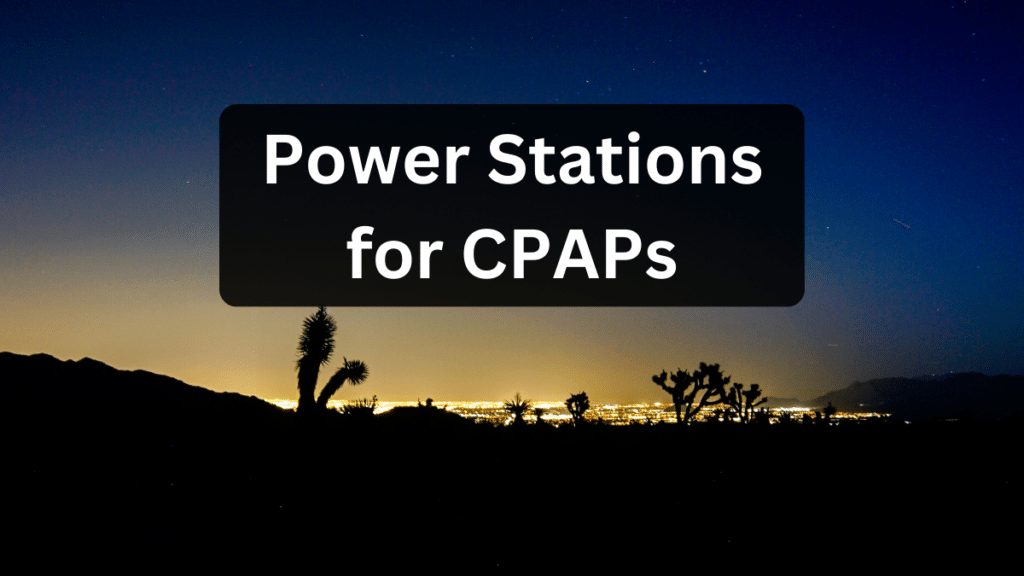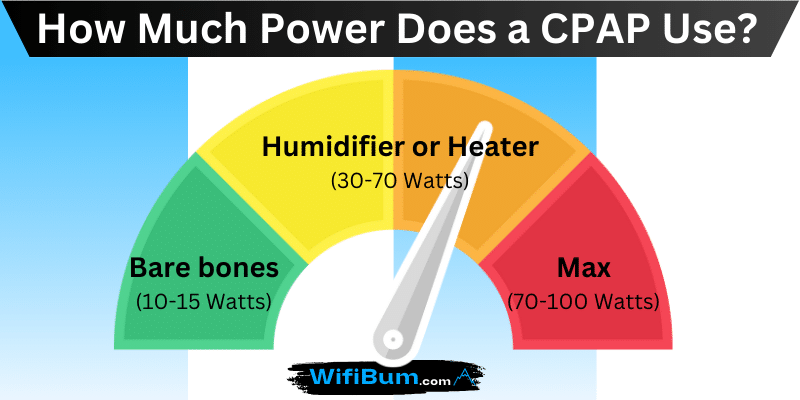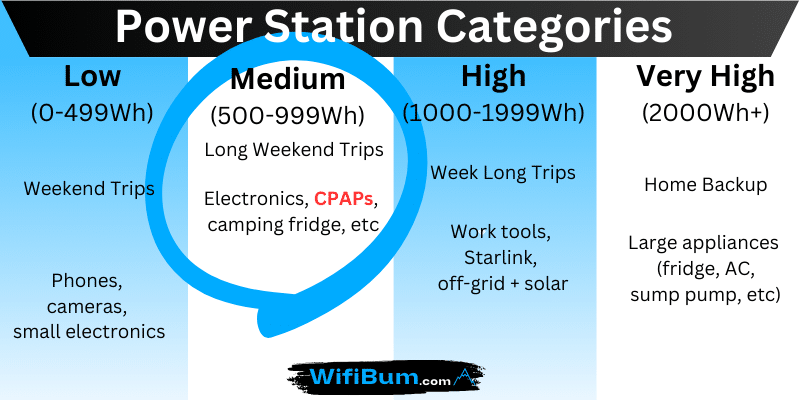Continuous Positive Airway Pressure (CPAP) machines are crucial for those of us dealing with conditions like sleep apnea. Most CPAP devices operate using AC power. This can pose challenges and risks when power sources are unavailable during power outages, travel, or camping.
Thankfully, portable battery backups (aka portable power stations) can solve this problem.
In this guide, I’m going to go over the best battery backups tailored for CPAP machines, factors to consider before your purchase, and my personal recommendations.
This guide is divided into the following sections:
- Understanding CPAP Power Consumption – factors affecting power consumption
- How to Choose a Portable Power Station – the important criteria
- Power Station Comparison Table – quick reference
- The Best Power Stations for CPAP Machines – detailed breakdown and recommendations

How Much Power Does a CPAP Machine Consume?
A CPAP machine consumes between 10 to 100 watts per hour. The low end is the bare bones usage and the high end is using the humidifier and heater. Others use 30 to 60 watts as their estimate.
Because it’s CRITICAL for you to get this part right, I highly recommend getting a Kill-A-Watt monitor to determine your exact usage with various settings. The numbers on your CPAP machine will give you the MAX, while the tool below will give you actual usage.
Here are some factors that can influence the power consumption of a CPAP machine:
Machine Type
There are different types of positive airway pressure machines – CPAP, BiPAP (Bi-level Positive Airway Pressure), and APAP (Automatic Positive Airway Pressure). Each may have different power requirements.
In general, a CPAP running with no extra features (humidifier or heating) will consume about 10W per hour.
Humidifier
Many CPAP machines have built-in humidifiers. The humidifier can almost double the power consumption, especially at higher settings. If you’re trying to conserve power, consider turning the humidifier off.
Heated Hose / Tubing
Some CPAP machines offer heated tubing to prevent condensation inside the hose. Like the humidifier, using heated tubing can also increase power usage.
With both the humidifier and heated tube, you can expect to consume 70W or above, or 560W for an 8 hour night of sleep.

Pressure Settings
The higher the pressure setting, the more power the machine will generally use.
Ambient Temperature
Cold and dry environments will impact the power you need. The CPAP will need to work harder to warm or humidify the air to a specific comfort level. For example, if you’re camping in cold weather and plan on using the heating tube, it could use a noticeable amount of additional power.
How to Choose a Portable Power Station for CPAP
I write extensively on portable power stations and divide them into 4 general categories based on their battery size.

1. Battery Life
Battery life is the most important factor when considering a power station backup for a CPAP machine. The battery capacity determines how long you can run your CPAP machine uninterrupted on your given settings.
For example, if your CPAP draws 50Wh, and you have a 500Wh capacity battery in your power station, the battery can power the CPAP for roughly 10 hours.
However, if you use the AC outlet on a power station, they are typically 85% efficient, making the calculation ((500Wh * 85)) / 50Wh) = 8.5 hours.
The last thing you want is the battery to die in the middle of the night, so I recommend going a size larger than you think you need.
Pro Tip: Connecting your CPAP directly to the battery’s DC port (vs AC) and disabling additional features like humidifiers and heaters can extend the battery’s life, sometimes even tripling the duration.
2. Size, Weight, and Portability
A balance between the battery’s size, weight, and efficiency is essential. Each year, power stations are becoming more compact, but they are still bulky and can be inconvenient if you’re camping in a small tent. If your use is primarily as a home backup, then this is less of an issue.
Power stations used as CPAP battery backups can use LiFePO4 or NMC battery chemistry. In short, LiFePO4 is typically recommended unless weight and portability is key. Then NMC is recommended. Read my full article on LiFePO4 vs NMC batteries.
3. Display and Monitoring
An underrated but critical feature when selecting a portable battery backup for CPAP is the display and monitoring capability.
A clear and detailed display can provide crucial information about the battery’s remaining capacity, output, input, and more. This enables you to monitor your usage, predict how long your battery will last, and decide when to recharge.
Some newer power stations also come with mobile apps or remote monitoring features. These tools not only provide the convenience of checking the battery status without having to physically access the unit, but they also give you access to advanced data analytics and predictive maintenance tips.
Pro Tip: Look for battery backups that provide real-time watt-hour usage and estimates on remaining run-time based on current draw. This ensures you’re never caught off guard.
4. Noise Level
Most power stations that can power a CPAP machine will have a built-in fan to help regulate the unit’s temperature. Some are known for being extremely loud, while others run occasionally and won’t bother most people.
If you’re camping in warm weather, the fan will likely turn on and off more frequently.
Read reviews and user feedback regarding the noise level of the battery backup before purchasing. A quiet unit is invaluable for an uninterrupted night’s rest.
5. Output Ports (AC, DC, USB)
Different CPAP machines and accessories may require different types of connections. It’s imperative to choose a battery backup that offers a variety of output ports to accommodate your needs.
Most power stations will provide AC outlets, but also check for DC ports, which, as mentioned earlier, can be more efficient for CPAP machines.
USB ports can be beneficial for charging other devices like your smartphone, ensuring you have all your necessities charged up, especially if you’re camping or during power outages.
Comparison of CPAP Power Stations
Below is a comparison table of CPAP power stations. I created this table so you can easily sort by price, size, and brand among other factors.
| Brand | Power Station | Size (Wh) | Amazon | Amazon | Price per Wh | Direct | With Discount | Price per Wh |
|---|---|---|---|---|---|---|---|---|
| EcoFlow | River 2 | 256 | Amazon | $189.00 | $0.74 | EcoFlow.com | $198.55 | $0.78 |
| Anker | PowerHouse 521 | 256 | Amazon | $219.00 | $0.86 | Anker.com | $197.99 | $0.77 |
| Bluetti | EB3A | 268 | Amazon | $209.00 | $0.78 | Bluetti.com | $202.73 | $0.76 |
| EcoFlow | River 2 Max | 512 | Amazon | $379.00 | $0.74 | EcoFlow.com | $379.05 | $0.74 |
| Anker | PowerHouse 535 | 512 | Amazon | $499.00 | $0.97 | Anker.com | $449.99 | $0.88 |
| Bluetti | EB55 | 537 | Amazon | $399.00 | $0.74 | Bluetti.com | $387.03 | $0.72 |
| Bluetti | EB70S | 716 | Amazon | $499.00 | $0.70 | Bluetti.com | $484.03 | $0.68 |
| EcoFlow | River 2 Pro | 768 | Amazon | $499.00 | $0.65 | EcoFlow.com | $521.55 | $0.68 |
| EcoFlow | Delta 2 | 1024 | Amazon | $749.00 | $0.73 | EcoFlow.com | $949.05 | $0.93 |
| Anker | PowerHouse 555 | 1024 | Amazon | $899.98 | $0.88 | Anker.com | $809.98 | $0.79 |
| Bluetti | AC180 | 1152 | Amazon | $749.00 | $0.65 | Bluetti.com | $872.03 | $0.76 |
| Anker | SOLIX F1200 | 1229 | Amazon | $899.00 | $0.73 | Anker.com | $989.99 | $0.81 |
| EcoFlow | Delta 2 Max | 2048 | Amazon | $1,699.00 | $0.83 | EcoFlow.com | $1,519.05 | $0.74 |
| Anker | SOLIX F2000 | 2048 | Amazon | $1,798.00 | $0.88 | Anker.com | $1,439.10 | $0.70 |
| Bluetti | AC200P | 2048 | Amazon | $1,199.00 | $0.59 | Bluetti.com | $1,163.03 | $0.57 |
| Bluetti | AC200MAX | 2048 | Amazon | $1,599.00 | $0.78 | Bluetti.com | $1,551.03 | $0.76 |
| Jackery | Explorer 2000 Plus | 2048 | Amazon | $1,999.00 | $0.98 | Jackery.com | $1,979.10 | $0.97 |
| EcoFlow | Delta 2 Pro | 3600 | Amazon | $2,799.00 | $0.78 | EcoFlow.com | $3,039.05 | $0.84 |
| Anker | SOLIX F2000 w/ Expansion Battery | 4096 | Amazon | $2,799.00 | $0.68 | Anker.com | $2,339.10 | $0.57 |
Best Power Stations for CPAP Backup
The list of best power stations for CPAP backup includes batteries compatible with major CPAP brands like Resmed, Philips, and DeVilbliss. Typically, you’ll want a battery capacity from 200Wh to 750Wh depending on how many nights you’re using it and which features you’re using on the CPAP.
1. EcoFlow River 2 Pro
Description & Features
The EcoFlow River 2 Pro portable power station is the best power station for CPAP. The battery capacity at 768Wh is great for worry-free power. It will power your CPAP for a full night, with all the comfort settings.
- Battery Capacity: 768Wh
- Weight: 17.2 lbs
- Output Ports: AC, USB-A, Fast USB-C, DC
- Warranty: 5 years
Why I Like It
- Battery: Powers a full night of sleep, worry-free
- Versatility: Compatible with CPAPs and other devices.
- Quick Recharge Time: Gets fully charged within 70 minutes.
- Durable Build: Robust design suitable for outdoor use.
EcoFlow LiFePO4 power stations are some of the highest-rated and reviewed power stations.
It uses a LiFePO4 battery, meaning it has a long lifespan and can be depleted to 0% without damaging the battery.
If you are interested, you can learn the differences between LiFePO4 and Li-NMC batteries. All batteries recommended here except the Jackery 500 use LiFePO4.
2. EcoFlow River 2 Max
The EcoFlow River 2 Max has many of the same great features as the Pro, but it is slightly smaller in capacity which makes it more affordable.
Description & Features
It will power your CPAP for a full night if you’re using around 50W per hour.
- Battery Capacity: 512Wh
- Weight: 13.3 lbs
- Output Ports: AC, USB-A, Fast USB-C, DC
- Warranty: 5 years
Why I Like It
- Battery: Powers a full night of sleep, worry-free
- Versatility: Compatible with CPAPs and other devices.
- Quick Recharge Time: Gets fully charged within 60 minutes.
- Durable Build: Robust design suitable for outdoor use.
3. Anker Power Station for CPAP
Description & Features
The Anker 535 portable power station a great option for your CPAP. The battery capacity at 512 is great for worry-free power.
- Battery Capacity: 512Wh
- Weight: 16.8 lbs
- Output Ports: AC, USB-A, Fast USB-C, DC
- Warranty: 5 years
Why I Like It
- Battery: Powers a full night of sleep, worry-free
- Versatility: Compatible with CPAPs and other devices.
- Recharge: Can recharge with common USB-C ports along with AC
Why I Don’t Like It
- Weight: It weights 3lbs more than the EcoFlow River Max 2 for the same battery size.
- Handle: The handle is nice, but doesn’t fold down
4. Bluetti EB55
Description & Features
The Bluetti EB55 is another great option. Bluetti has been around for years and is known for its high-quality and long-lasting power stations.
- Battery Capacity: 537Wh
- Weight: 16.5 lbs
- Output Ports: AC, USB-A, Fast USB-C, DC
- Warranty: 5 years
Why I Like It
- Great Value: This unit goes on sale frequently and you can get great deals.
- Battery: Great reputation
- Versatility: Great for camping, CPAP, etc
- Foldable Handle: Handle can drop into itself so you can easily place items on top of it and fits easier in the car.
Why I Don’t Like It
- Weight: It weights 3lbs more than the EcoFlow River Max 2 for the same battery size.
- Handle: The handle is nice, but doesn’t fold down
5. Jackery Explorer 500 for CPAP Power
Jackery is the only battery in my recommendations that is not LiFePO4. I prefer LiFePO4 power stations, but I make an exception for Jackery because I’ve had one for 4+ years, and it has held up well. They are also lighter and easily portable.
Description & Features
Jackery has sold over 3 million power stations and are well-known in the outdoor community. The use NMC battery chemistry, which means they are lighter than equivalent LiFePO4, but will have a shorter useful lifespan (500 cycles to 80% vs 2500 to 3000 for LiFePO4).
Another disadvantage of NMC batteries is that you are not supposed to discharge them below 20% or it can impact the battery health. So, your effective capacity is not only reduced by the inverter efficiency, but also by the depth of discharge limitation.
- Battery Capacity: 518Wh (or 350Wh factoring efficiency and depth of discharge)
- Weight: 17.2 lbs
- Output Ports: AC, USB-A, Fast USB-C, DC
- Warranty: 5 years
Why I Like It
- Battery: Reliable brand, my Jackery 1000 is still going strong 4 years later.
- Durable Build: Robust design suitable for outdoor use and bumpy roads.
Why I Don’t It
- Depth of Discharge: There’s no way to monitor or shut it off when it hits 20%, so using it with a CPAP, you’re likely to drain it below the recommended limits.
- NMC Battery: While great for some situations, I prefer LiFePO4 batteries for CPAPs.
6. Ecoflow Budget Option (SMALL)
The Ecoflow River 2 is the little brother of the River 2 Max and River 2 Pro mentioned above. However, it will not power a full night of sleep when using the humidifier or heater.
If you’re using the bare-bones settings, this can still get you through a weekend of camping.
Description & Features
The EcoFlow River 2 is a great, budget-friendly option to power your CPAP for a weekend of camping.
- Battery Capacity: 256Wh
- Weight: 7.7 lbs
- Output Ports: AC, USB-A, Fast USB-C, DC
- Warranty: 5 years
Why I Like It
- Battery: Can power your CPAP for under $200
- Versatility: Great to bring along on any short trips
- Quick Recharge Time: Gets fully charged within 60 minutes.
- Durable Build: Robust design suitable for outdoor use.
7. Bluetti EB70S
I’m including the Bluetti EB70S as an Ecoflow alternative. It’s a great value for a mid-sized power station.
Description & Features
The Bluetti EB70S is an extremely popular power station in the outdoor community and great for CPAP camping. The battery capacity at 716Wh is great for worry-free power. It will power your CPAP for a full night, with all the comfort settings.
- Battery Capacity: 716Wh
- Weight: 21.4 lbs
- Output Ports: AC, USB-A, Fast USB-C, DC
- Warranty: 5 years
Why I Like It
- Battery: Powers a full night of sleep, worry-free
- Versatility: CPAP battery backup along with charging other devices
- Durable Build: Robust design suitable for outdoor use.
Why I Don’t Like It
- Weight: At 4lbs heavier than a slightly larger Ecoflow, it’s unnecessarily heavy
FAQ About CPAP Battery Backup

How long can a CPAP run on a battery backup?
A CPAP’s runtime on a power station depends on the machine’s power consumption, the capacity of the power station, and any additional features activated on the CPAP. In my experience, a fully charged 500Wh power station can power a CPAP machine for anywhere from one to multiple nights, depending on the aforementioned factors.
How big of a battery do I need for a CPAP backup?
The required battery size depends on your CPAP machine’s wattage and how long you need the machine to run. As a general guideline, consider the nightly watt-hour consumption of your CPAP and then choose a power station with a capacity that meets or exceeds this, factoring in additional time for emergencies or multiple nights.
How do I use my CPAP without electricity?
To use a CPAP machine without direct electricity, you can rely on a portable power station charged in advance. Ensure the power station is compatible with your CPAP machine, connect the device using the appropriate outlets (preferably DC for efficiency), and operate it as usual.
Can I use any portable power station for my CPAP machine?
Not all power stations may be suitable for every CPAP machine. It’s crucial to check both the power station’s specifications and your CPAP machine’s requirements to ensure compatibility, especially in terms of output type and power capacity.
Is it safe to use a CPAP machine with a power station?
Yes, using a CPAP machine with a reputable power station is safe. Ensure the power station offers a pure sine wave output for consistent power, and you should always adhere to manufacturer guidelines for both the CPAP machine and the power station.








